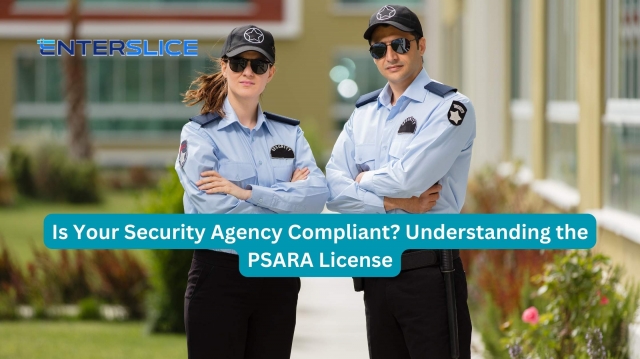In the ever-growing security industry, ensuring your security agency operates legally and ethically is crucial. One of the key legal requirements for security companies in India is obtaining the PSARA License (Private Security Agencies Regulation Act License). Whether you are planning to start a security business or already running one, understanding what PSARA License is and how to obtain it is vital for smooth and compliant operations.
In this blog, we will dive deep into the PSARA License, explore why it's important, who needs it, and how to ensure your security agency stays compliant with the regulations.
What is the PSARA License?
The PSARA License is issued under the Private Security Agencies Regulation Act (PSARA), 2005, which aims to regulate the private security industry in India. This act is a part of the government's efforts to ensure the safety, security, and professionalism of private security agencies that provide services such as guarding, surveillance, and other security-related tasks.
The license ensures that security agencies operate legally and follow ethical practices, safeguarding both the clients and the security personnel involved. It helps in maintaining the credibility and professionalism of the private security sector.
Why is the PSARA License Important for Your Security Agency?
A PSARA License is not just a legal requirement – it also offers a variety of benefits to your security agency:
-
Legality and Compliance: Operating without a PSARA License can lead to penalties or shutdowns. With the license, your agency is legally recognized, ensuring smooth business operations.
-
Credibility: The PSARA License assures clients that your security personnel are well-trained and the agency adheres to national standards, which builds trust.
-
Access to Government Opportunities: Many government and corporate clients require PSARA-compliant security agencies for their projects. The license opens up opportunities for bigger contracts.
-
Employee Welfare: The PSARA regulations require security agencies to provide adequate training and benefits to their employees, ensuring their safety and well-being.
-
Professionalism: With the PSARA License, your agency must follow specific rules, such as background checks for employees and regular training, ensuring the highest level of service quality.
Who Needs a PSARA License?
Any security agency providing services related to security, guarding, surveillance, or similar services must obtain a PSARA License. This includes:
- Security Guard Agencies: Agencies offering manned guarding services to private companies, homes, or government bodies.
- Investigation Agencies: Agencies involved in providing investigation services, such as detective work.
- Security Consultants: Agencies offering consulting services related to security systems and protocols.
- Event Security Providers: Agencies that provide security services during large public events, corporate events, or VIP protection.
If your business involves providing private security services or personnel, you must apply for a PSARA License to operate legally.
PSARA License Eligibility Criteria
Before applying for the PSARA License, your security agency must meet certain eligibility criteria. These include:
-
Legal Structure: Your agency must be a registered entity, such as a private limited company, limited liability partnership (LLP), or a partnership firm, under the Companies Act, 2013.
-
Net Worth Requirements: To obtain a PSARA License, your security agency should have a minimum net worth as per the regulations. The minimum net worth requirement varies based on the size of the business and the state in which you are applying.
-
Trained Personnel: The agency must employ trained personnel who have completed a government-approved training program in security services.
-
Background Checks: All employees of the security agency must undergo police verification, which is mandatory to ensure the credibility and trustworthiness of the security staff.
-
Proper Documentation: Your agency must maintain and submit proper documents, such as the company's incorporation certificate, employee training certificates, and proof of financial stability, to qualify for the license.
-
Compliance with Labor Laws: Your agency must follow labor laws, including providing fair wages, insurance, and benefits to security personnel as mandated by the PSARA regulations.
How to Apply for the PSARA License?
The process of obtaining the PSARA License is straightforward, but it requires careful attention to detail. Here's a step-by-step guide:
1. Submit Application
The first step is to submit an application to the respective State Government's authority (usually the Home Department or State Police Department) responsible for issuing PSARA Licenses. The application should include:
- Agency's legal documents (Incorporation certificate, PAN, etc.)
- Training details of employees
- Police verification reports of employees
- Net worth details
2. Verification Process
Once the application is submitted, the authorities will conduct a thorough verification of the documents, employee records, and other details provided. This includes verifying the credibility of the agency and its employees.
3. Compliance Check
The authorities will also ensure that your agency is complying with all PSARA guidelines, including the minimum net worth requirement and employee welfare standards.
4. Issuance of License
If your agency meets all the criteria and passes the verification process, you will be issued the PSARA License. The license is generally valid for five years, after which it needs to be renewed.
Maintaining PSARA License Compliance
Once your agency receives the PSARA License, it is important to maintain compliance to avoid penalties or revocation of the license. Some key compliance points include:
-
Training and Certification: Ensure that your security personnel undergo regular training and obtain the necessary certifications as per PSARA guidelines.
-
Regular Employee Background Checks: It's crucial to maintain updated police verification reports for all employees, especially if they change roles or leave and join the agency.
-
Renewal of License: Your PSARA License is valid for five years. Be sure to apply for its renewal before it expires to avoid any disruptions in operations.
-
Adhere to Operational Guidelines: Follow all operational and safety standards as mandated by PSARA, including employee welfare and compensation.
-
Audit and Inspection: Regular audits and inspections may be conducted by the authorities to ensure ongoing compliance with PSARA regulations.
Conclusion
In conclusion, obtaining and maintaining a PSARA License is essential for the legal operation and success of your security agency. By ensuring compliance with the Private Security Agencies Regulation Act, your agency not only operates within the law but also gains credibility, trust, and access to bigger opportunities. The process might seem daunting, but with the right preparation and knowledge, securing the PSARA License becomes a straightforward task.
By adhering to all the eligibility criteria, guidelines, and renewal processes, your security agency can thrive in a highly competitive industry while providing safe and professional services to your clients.
FAQs:
1. What is the cost of obtaining a PSARA License?
The cost varies based on factors like the size of the agency, the state where the application is made, and the number of employees. It typically ranges from a few thousand to several lakhs of rupees.
2. Can a company provide security services without a PSARA License?
No, it is illegal to provide security services without a valid PSARA License. Operating without it can lead to fines or closure of the business.
3. How long does it take to get a PSARA License?
The application process for a PSARA License can take anywhere from 30 to 60 days, depending on the state and the completeness of the application.
Also, read:
Benefits of Copyright Registration
How B2B Debt Recovery Services can benefit your corporation?






